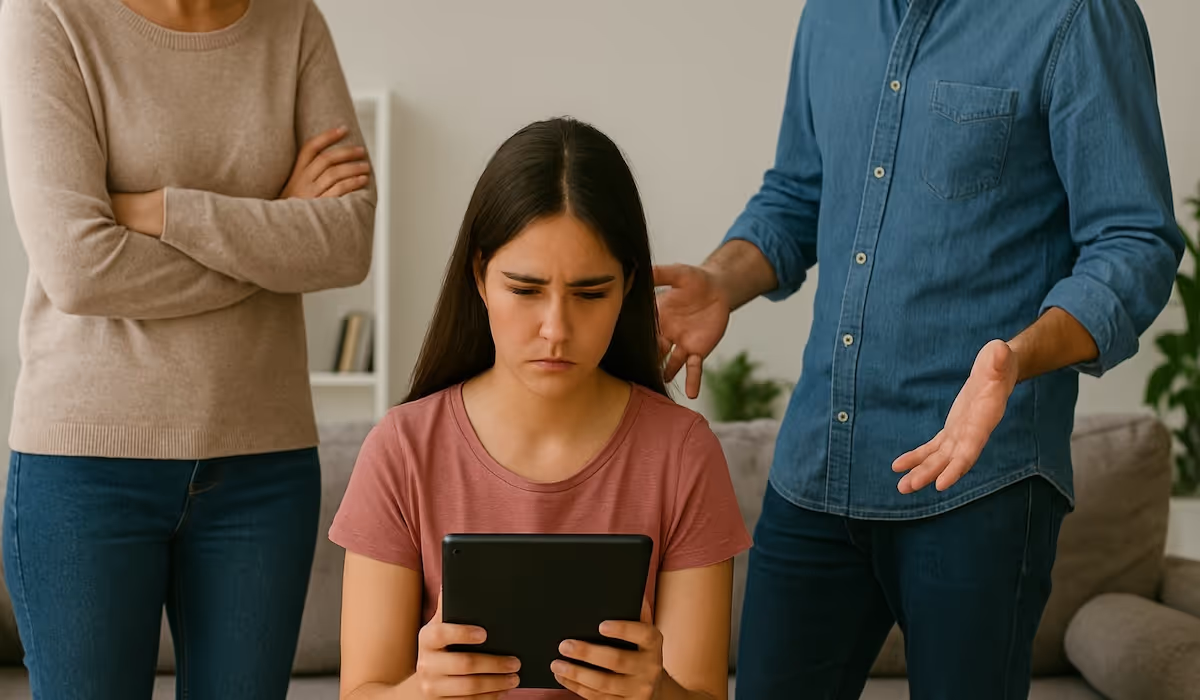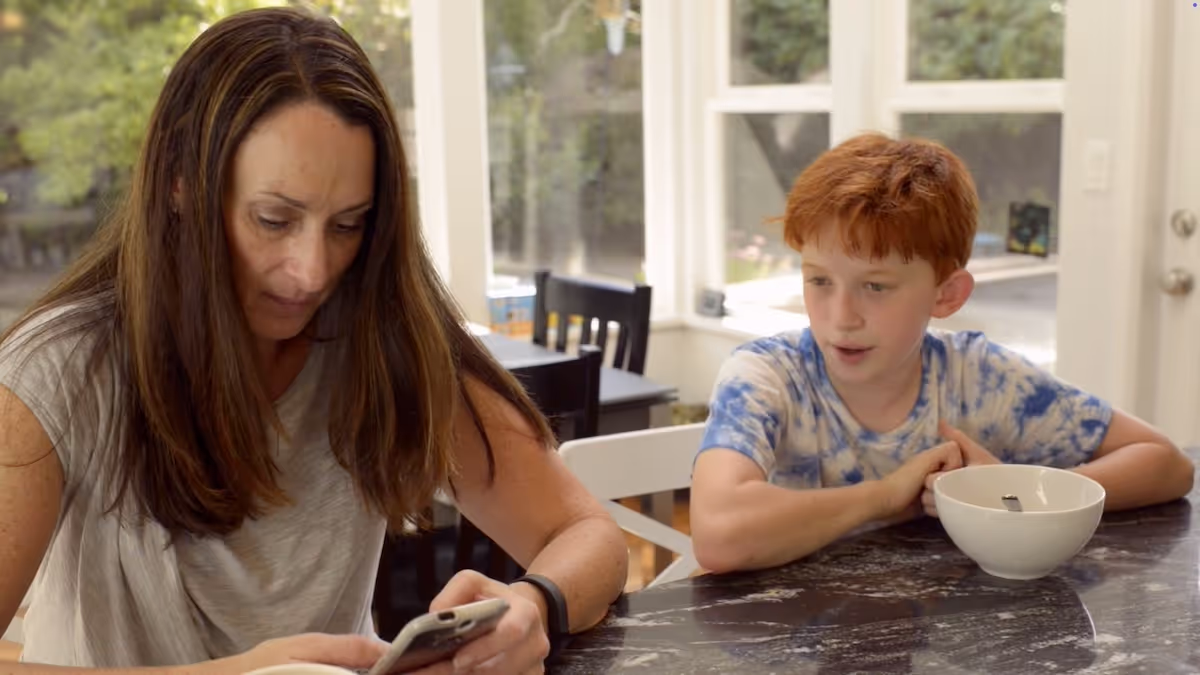


Are you co-parenting kids? Do you find that one of you focuses more on establishing rules about screen time while the other is less concerned? You don’t need me to tell you that answering yes to that question is incredibly common, and it can be a major stressor in homes.
Yesterday, we released our podcast episode, When Co-Parents Clash Over Screen Rules with author and family psychologist Laura Kastner, PhD. It explores various solutions to common struggles with screen rules, including the challenge of differing parental views and behaviors regarding rules.
You can listen to the full podcast episode here: Website // Apple Podcasts // Spotify // YouTube
When working with parents on screen time limits, Laura Kastner emphasizes that one parent often adopts more of a caregiver role, while the other serves as the “hardline”, concentrating on structure and boundaries.
Here’s a fascinating point Laura makes: Invariably, parents dig in deeper into their stances, and with time, parents become more and more polarized. Laura sees this time again and again.
It is not that parents want that, quite the opposite, they wish they were less at odds, but so often, it just gets worse.
Sound familiar?
So what to do?
Learn more about showing our movies in your school or community!
Join Screenagers filmmaker Delaney Ruston MD for our latest Podcast

Learn more about our Screen-Free Sleep campaign at the website!
Our movie made for parents and educators of younger kids
Learn more about showing our movies in your school or community!
Scenario: Parent A is dead set that their child does not go directly onto a screen in the morning during summer. Parent B believes it is acceptable.
Action: Parent A and B sit down to draft about five potential rules. For example, the child could be allowed to use screens an hour after waking up, along with four other suggestions. Consider including an obviously out-of-the-question solution to keep things lighthearted.
Reason behind the action: Now you're working together, generating ideas — similar to a work meeting. This process helps both individuals step out of their emotional brains, making collaboration more likely.
Reason: Same idea: staying in the intellectual challenge—i.e., the logic part of the brain—and less in the emotional/more reactive part of the brain.
Generally, kids are very aware when their parents have different views on screen time rules, and they are even more aware of parents’ arguments than we might realize.
Putting words to the reality of disagreements is a good thing.
You might say something like, “We both have your best interests in mind. And it is very normal to disagree about the best way to do that.”
You may decide to involve your child in brainstorming different limits of screen time and the pros and cons of each.
Polarization often worsens over time. Laura points out that polarization is not static — it’s a verb. The risk of a widening gap is real. Both parents want the best for their child, but anxiety and strong emotions can deepen the divide.
It can be such a significant issue that seeking help from an outside person may be a very smart move. I know it can be a major hurdle to find a couple's or family therapist, but doing so can ultimately save a lot of pain in the long run. It doesn't have to involve months of sessions; even a few can provide parents with the understanding and tools to embark on a better path.
If such a person is unavailable, consider committing to read a book together and setting aside about 20 minutes each week to discuss and implement ideas. There are plenty of such books available, including my book “Parenting In The Screen Age.”
Another option is to gather a group of parents a few times specifically to discuss challenges related to rule-setting. In that context, you will hear how other parents navigate their various approaches to rule-setting, which may provide you with new ideas. It will also help you and your co-parent feel less isolated in your struggles as a couple regarding this issue.
Learn more about showing our movies in your school or community!
Join Screenagers filmmaker Delaney Ruston MD for our latest Podcast

Learn more about our Screen-Free Sleep campaign at the website!
Our movie made for parents and educators of younger kids
Join Screenagers filmmaker Delaney Ruston MD for our latest Podcast
Be sure to subscribe to our YouTube Channel! We add new videos regularly and you'll find over 100 videos covering parenting advice, guidance, podcasts, movie clips and more. Here's our most recent:
As we’re about to celebrate 10 years of Screenagers, we want to hear what’s been most helpful and what you’d like to see next.
Please click here to share your thoughts with us in our community survey. It only takes 5–10 minutes, and everyone who completes it will be entered to win one of five $50 Amazon vouchers.
Are you co-parenting kids? Do you find that one of you focuses more on establishing rules about screen time while the other is less concerned? You don’t need me to tell you that answering yes to that question is incredibly common, and it can be a major stressor in homes.
Yesterday, we released our podcast episode, When Co-Parents Clash Over Screen Rules with author and family psychologist Laura Kastner, PhD. It explores various solutions to common struggles with screen rules, including the challenge of differing parental views and behaviors regarding rules.
You can listen to the full podcast episode here: Website // Apple Podcasts // Spotify // YouTube
When working with parents on screen time limits, Laura Kastner emphasizes that one parent often adopts more of a caregiver role, while the other serves as the “hardline”, concentrating on structure and boundaries.
Here’s a fascinating point Laura makes: Invariably, parents dig in deeper into their stances, and with time, parents become more and more polarized. Laura sees this time again and again.
It is not that parents want that, quite the opposite, they wish they were less at odds, but so often, it just gets worse.
Sound familiar?
So what to do?
Scenario: Parent A is dead set that their child does not go directly onto a screen in the morning during summer. Parent B believes it is acceptable.
Action: Parent A and B sit down to draft about five potential rules. For example, the child could be allowed to use screens an hour after waking up, along with four other suggestions. Consider including an obviously out-of-the-question solution to keep things lighthearted.
Reason behind the action: Now you're working together, generating ideas — similar to a work meeting. This process helps both individuals step out of their emotional brains, making collaboration more likely.
Reason: Same idea: staying in the intellectual challenge—i.e., the logic part of the brain—and less in the emotional/more reactive part of the brain.
Generally, kids are very aware when their parents have different views on screen time rules, and they are even more aware of parents’ arguments than we might realize.
Putting words to the reality of disagreements is a good thing.
You might say something like, “We both have your best interests in mind. And it is very normal to disagree about the best way to do that.”
You may decide to involve your child in brainstorming different limits of screen time and the pros and cons of each.
Polarization often worsens over time. Laura points out that polarization is not static — it’s a verb. The risk of a widening gap is real. Both parents want the best for their child, but anxiety and strong emotions can deepen the divide.
It can be such a significant issue that seeking help from an outside person may be a very smart move. I know it can be a major hurdle to find a couple's or family therapist, but doing so can ultimately save a lot of pain in the long run. It doesn't have to involve months of sessions; even a few can provide parents with the understanding and tools to embark on a better path.
If such a person is unavailable, consider committing to read a book together and setting aside about 20 minutes each week to discuss and implement ideas. There are plenty of such books available, including my book “Parenting In The Screen Age.”
Another option is to gather a group of parents a few times specifically to discuss challenges related to rule-setting. In that context, you will hear how other parents navigate their various approaches to rule-setting, which may provide you with new ideas. It will also help you and your co-parent feel less isolated in your struggles as a couple regarding this issue.
Be sure to subscribe to our YouTube Channel! We add new videos regularly and you'll find over 100 videos covering parenting advice, guidance, podcasts, movie clips and more. Here's our most recent:
Sign up here to receive the weekly Tech Talk Tuesdays newsletter from Screenagers filmmaker Delaney Ruston MD.
We respect your privacy.
Are you co-parenting kids? Do you find that one of you focuses more on establishing rules about screen time while the other is less concerned? You don’t need me to tell you that answering yes to that question is incredibly common, and it can be a major stressor in homes.
Yesterday, we released our podcast episode, When Co-Parents Clash Over Screen Rules with author and family psychologist Laura Kastner, PhD. It explores various solutions to common struggles with screen rules, including the challenge of differing parental views and behaviors regarding rules.
You can listen to the full podcast episode here: Website // Apple Podcasts // Spotify // YouTube
When working with parents on screen time limits, Laura Kastner emphasizes that one parent often adopts more of a caregiver role, while the other serves as the “hardline”, concentrating on structure and boundaries.
Here’s a fascinating point Laura makes: Invariably, parents dig in deeper into their stances, and with time, parents become more and more polarized. Laura sees this time again and again.
It is not that parents want that, quite the opposite, they wish they were less at odds, but so often, it just gets worse.
Sound familiar?
So what to do?

Thoughtful family tech rules help protect kids’ wellbeing, learning, and sleep while strengthening connection at home. Using the fresh start of a new year, this post shares eight practical tech habits families can discuss and adapt together, including shared social media check-ins, screen time inventories, device-free meals, regular gaming breaks, and keeping phones out of bedrooms at night.
READ MORE >
Psychologist Jean Twenge explains how parental controls can support healthier tech use by protecting sleep, limiting late night device access, and reducing kids’ exposure to content they are not developmentally ready to handle. She discusses why third party parental control tools are often more effective and easier to use than built in options, while acknowledging that no system is perfect. Clear boundaries, combined with technology based limits, can reduce ongoing conflict and make screen time rules easier to enforce.
READ MORE >
for more like this, DR. DELANEY RUSTON'S NEW BOOK, PARENTING IN THE SCREEN AGE, IS THE DEFINITIVE GUIDE FOR TODAY’S PARENTS. WITH INSIGHTS ON SCREEN TIME FROM RESEARCHERS, INPUT FROM KIDS & TEENS, THIS BOOK IS PACKED WITH SOLUTIONS FOR HOW TO START AND SUSTAIN PRODUCTIVE FAMILY TALKS ABOUT TECHNOLOGY AND IT’S IMPACT ON OUR MENTAL WELLBEING.
